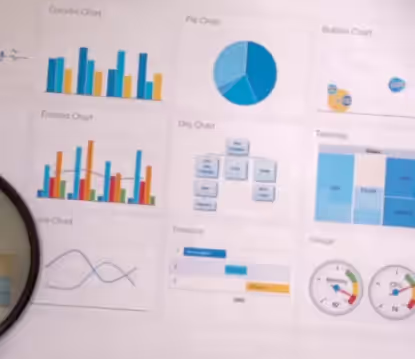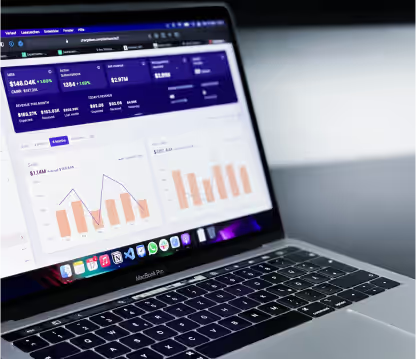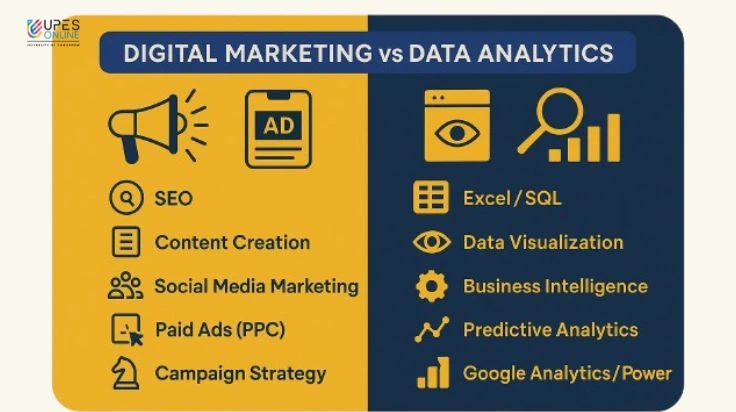Potential of MBA Business Analytics: Career Opportunities & Roles

MBA in Business Analytics is a versatile field that offers a wide range of career opportunities for graduates. The field encompasses various aspects of data analysis, from collecting and cleaning data, to developing and implementing models, to communicating findings and recommendations to stakeholders.
Congratulations on getting through with your first step towards an illustrious career. It is an indication of your arduous work and dedication that has brought you to the next big decision of your career. Considering the financial investment and mental duty the next 2 years demand from you, it becomes a vital decision for you to choose your specialization that is not only in alignment with your skillset and personality but is also a financially gratifying domain for the years to come.
According to a study by IBM, 39% of job postings in Data Science and Advanced Analytics require applicants to possess at least a master’s degree. MBA in Business Analytics could be a rewarding choice for somebody who has a special balance of technical aptitude, critical thinking, and business acumen to extract meaningful insights from data and inform business decisions through those insights.
Let’s Understand What is Business Analytics?
Back in those days, companies used to conduct mass-level surveys and based upon the data and feedback collected from the bulk responses, organizations used to lay out their growth plans. However, in the 21st century, we are using and generating a galvanic volume of data: 2.5 quintillion bytes a day that includes everything ranging from your geographical demographics to the last penny of your debit card purchases. Here is where the role of Business Analytics comes into existence. It simply helps you gather statistical analysis and profound insights out of the structured and unstructured data collected.
How Does Business Analytics Work?
The statistical analysis helps businesses measure their performance with respect to their customers’ consumption behaviour and the competitive ecosystem in which it operates. It helps you to predict future outcomes and guide your decisions with data-driven insights.
The historical data about a company’s performance is reviewed through a technique called Business Intelligence.
Thereafter, Advance Analytics is used to predict how a proposed design or service will affect their revenue through the application of statistical algorithms.
It gives a company the competitive edge by providing –
- Information-based solutions to real-time business problems
- Insights from customers’ financial background and expenditure patterns
- Opportunities for up-selling and cross-selling
Some of the Key Roles and Responsibilities for Business Analytics MBA graduates include
With an MBA in Business Analytics, there are a plethora of opportunities available to you which includes the prestigious C-suite positions as well.
- Data Analyst or Business Intelligence Analyst
- Data Scientist
- Predictive Modeler or Forecaster
- Business Analyst or Management Consultant
- Data Governance or Data Management Professional
- Big Data Engineer or Data Engineer
- Data Quality Analyst
- Data Security or Privacy Analyst
- Marketing Manager
- Personal Financial Advisor
- Financial Analyst
- Management Analyst
- Operations Research Analyst
- Decision Support Analyst or Data-Driven Strategist
- Econometrician or Time Series Analyst
- Artificial Intelligence or Machine Learning Engineer
- Natural Language Processing Engineer
- Recommender Systems Engineer
- Text Mining or Sentiment Analysis Analyst
- Data Storyteller or Communication Specialist
- Cloud Computing or Data Infrastructure Analyst
- Business Ethics or Social Impact Analyst
- Business Analytics Consultant or Business Analytics Manager
- Business Analytics Researcher or Business Analytics Faculty.
Is an MBA in Business Analytics a Good Fit for Me?
Given the massive amount of data being created every day, choosing a career in Business Analytics can be truly a rewarding decision. As long as you possess the right set of soft skills and core competencies to guide business with data-driven perspectives, you’re an irreplaceable resource in the market. These skills include:
- Technical proficiency – BI tools and software
- Strategic thinking
- Comfortable with statistics
- Good business-decision making skills
Here are the detailed summary of the scope of MBA in Business Analytics:
Who is a Data Analyst or Business Intelligence Analyst?
A Data Analyst or Business Intelligence Analyst is responsible for collecting, analyzing, and interpreting large sets of data to help organizations make informed business decisions. They use various tools and techniques to extract insights from data, and communicate their findings to stakeholders through reports, dashboards, and visualizations.
What are the key responsibilities of a Data Analyst or Business Intelligence Analyst?
- Collecting, cleaning, and organizing data from various sources
- Analyzing data using statistical techniques and tools
- Creating reports, dashboards, and visualizations to communicate findings
- Identifying trends, patterns, and insights in data
- Recommending actions and solutions based on data analysis
- Collaborating with cross-functional teams to implement data-driven decisions.
Who is a Data Scientist?
A Data Scientist is a professional who uses scientific methods, processes, algorithms and systems to extract insights and knowledge from structured and unstructured data. They apply statistical, machine learning and data mining techniques to analyze and interpret complex data sets.
What are the key responsibilities of a Data Scientist?
- Collecting, cleaning, and organizing large sets of data from various sources
- Building and implementing statistical, machine learning, and data mining models
- Identifying patterns and trends in data
- Communicating findings and recommendations to stakeholders
- Designing and implementing experiments and A/B tests
Collaborating with cross-functional teams to implement data-driven decisions.
Who is a Predictive Modeler or Forecaster?
A Predictive Modeler or Forecaster is responsible for using statistical and mathematical techniques to build models that can predict future outcomes or trends. They use data mining, machine learning, and other techniques to analyze data, and make predictions about future events. They work closely with data scientists, data engineers, and other teams to develop and implement solutions that provide insights and visibility into future trends and performance.
What are the key responsibilities of a Predictive Modeler or Forecaster?
- Collecting and analyzing large sets of data
- Building and implementing predictive models
- Identifying patterns and trends in data to predict future outcomes
- Developing and implementing predictive models and forecasting techniques.
- Communicating findings and recommendations to stakeholders
- Collaborating with cross-functional teams to implement data-driven decisions
- Continuously monitoring and updating predictive models and forecasting techniques
Who is a Business Analyst or Management Consultant?
A Business Analyst or Management Consultant is responsible for analyzing and interpreting business information to help organizations improve their performance. They use a variety of tools and techniques to understand and document the requirements of an organization and to recommend solutions to improve processes and operations.
What are the key responsibilities of a Business Analyst or Management Consultant?
- Conducting research and analyzing data to understand an organization’s performance and needs
- Identifying areas for improvement in business processes, operations and systems
- Communicating findings and recommendations to stakeholders
- Developing and implementing solutions to improve organizational performance
- Managing and coordinating projects to ensure successful implementation of solutions
- Collaborating with cross-functional teams to implement data-driven decisions
Who is a Data Governance or Data Management Professional?
A Data Governance or Data Management Professional is responsible for creating and implementing policies, procedures and standards to ensure the availability, integrity, and security of data within an organization. They work closely with data architects, data engineers and data analysts to ensure that data is accurate, consistent, and protected from unauthorized access.
What are the key responsibilities of a Data Governance or Data Management Professional?
- Developing and implementing data governance policies and procedures
- Ensuring data integrity, accuracy and consistency
- Managing data lineage and data lineage mapping
- Managing data security and data privacy
- Collaborating with cross-functional teams to implement data-driven decisions
- Communicating data governance policies and procedures to stakeholders.
Who is a Big Data Engineer or Data Engineer?
A Big Data Engineer or Data Engineer is responsible for designing, building, and maintaining the infrastructure and systems that support the organization’s big data needs. They work closely with data scientists and data analysts to ensure that data is properly collected, stored, and made available for analysis.
What are the key responsibilities of a Big Data Engineer or Data Engineer?
- Designing and building data pipelines and data architectures
- Managing and optimizing data storage and processing
- Building and maintaining data warehousing and business intelligence solutions
- Enabling data access and data discovery
- Collaborating with cross-functional teams to implement data-driven decisions
- Communicating data infrastructure and systems to stakeholders.
Who is a Data Quality Analyst?
A Data Quality Analyst is responsible for ensuring the accuracy, completeness, and consistency of data across an organization. They work closely with data scientists, data analysts, and data engineers to ensure that data is fit for purpose and meets the organization’s needs.
What are the key responsibilities of a Data Quality Analyst?
- Identifying data quality issues and determining root causes
- Developing and implementing data quality controls and data quality metrics
- Monitoring data quality and implementing corrective actions
- Communicating data quality issues and improvements to stakeholders
- Collaborating with cross-functional teams to implement data-driven decisions
- Developing and implementing data governance policies and procedures.
Who is an Operations Research Analyst?
An Operations Research Analyst is responsible for using mathematical and analytical methods to help organizations solve complex problems and make better decisions. They work closely with data scientists, data engineers, and other teams to identify problems, develop models, and implement solutions.
What are the key responsibilities of an Operations Research Analyst?
- Identifying and analyzing complex problems
- Developing mathematical models to solve problems
- Implementing solutions to improve organizational performance
- Communicating findings and recommendations to stakeholders
- Collaborating with cross-functional teams to implement data-driven decisions
- Monitoring and evaluating the effectiveness of solutions.
Who is Decision Support Analyst or Data-Driven Strategist?
A Decision Support Analyst or Data-Driven Strategist is responsible for using data and analytics to help organizations make better decisions. They work closely with data scientists, data engineers, and other teams to identify opportunities, develop strategies, and implement solutions.
What are the key responsibilities of a Decision Support Analyst or Data-Driven Strategist?
- Identifying and analyzing opportunities for improvement
- Developing and implementing data-driven strategies
- Communicating findings and recommendations to stakeholders
- Collaborating with cross-functional teams to implement data-driven decisions
- Monitoring and evaluating the effectiveness of strategies.
Who is an Econometrician or Time Series Analyst?
An Econometrician or Time Series Analyst is responsible for using statistical methods to model and analyze economic and financial data. They use techniques such as time series analysis, forecasting, and causal inference to understand complex economic and financial phenomena.
What are the key responsibilities of an Econometrician or Time Series Analyst?
- Collecting and analyzing economic and financial data
- Developing and implementing econometric and time series models
- Identifying patterns and trends in economic and financial data
- Communicating findings and recommendations to stakeholders
- Collaborating with cross-functional teams to implement data-driven decisions
- Continuously monitoring and updating models
Who is an Artificial Intelligence or Machine Learning Engineer?
An Artificial Intelligence or Machine Learning Engineer is responsible for designing, building, and deploying AI and ML models. They work closely with data scientists and other teams to develop and implement AI and ML solutions to improve organizational performance.
What are the key responsibilities of an Artificial Intelligence or Machine Learning Engineer?
- Designing and building AI and ML models
- Training and deploying AI and ML models
- Identifying and solving problems in AI and ML models
- Communicating findings and recommendations to stakeholders
- Collaborating with cross-functional teams to implement data-driven decisions
- Continuously monitoring and updating models
Who is a Natural Language Processing Engineer?
A Natural Language Processing Engineer is responsible for designing, building, and deploying NLP models and systems. They work closely with data scientists and other teams to develop and implement NLP solutions to improve organizational performance.
What are the key responsibilities of a Natural Language Processing Engineer?
- Designing and building NLP models and systems
- Training and deploying NLP models
- Identifying and solving problems in NLP models and systems
- Communicating findings and recommendations to stakeholders
- Collaborating with cross-functional teams to implement data-driven decisions
- Continuously monitoring and updating models
Who is a Recommender Systems Engineer?
A Recommender Systems Engineer is responsible for designing, building, and deploying recommender systems. They work closely with data scientists and other teams to develop and implement recommender systems to improve organizational performance.
What are the key responsibilities of a Recommender Systems Engineer?
- Designing and building recommender systems
- Training and deploying recommender systems
- Identifying and solving problems in recommender systems
- Communicating findings and recommendations to stakeholders
- Collaborating with cross-functional teams to implement data-driven decisions
- Continuously monitoring and updating models
Who is a Text Mining or Sentiment Analysis Analyst?
A Text Mining or Sentiment Analysis Analyst is responsible for using text mining and sentiment analysis techniques to extract insights from text data. They work closely with data scientists and other teams to develop and implement text mining and sentiment analysis solutions to improve organizational performance.
What are the key responsibilities of a Text Mining or Sentiment Analysis Analyst?
- Collecting and analyzing text data.
- Developing and implementing text mining and sentiment analysis models
- Identifying patterns and trends in text data
Who is a Data Storyteller or Communication Specialist?
A Data Storyteller or Communication Specialist is responsible for communicating data insights and findings to stakeholders in a clear, concise, and compelling way. They work closely with data scientists, data engineers, and other teams to develop and implement data visualization, data storytelling, and communication strategies.
What are the key responsibilities of a Data Storyteller or Communication Specialist?
- Collecting and analyzing data
- Communicating data insights and findings to stakeholders through data visualization, data storytelling, and other communication strategies
- Identifying and solving communication problems
- Collaborating with cross-functional teams to implement data-driven decisions
- Continuously monitoring and updating communication strategies
Who is a Cloud Computing or Data Infrastructure Analyst?
A Cloud Computing or Data Infrastructure Analyst is responsible for designing, building, and maintaining the cloud-based infrastructure and systems that support the organization’s data needs. They work closely with data scientists, data engineers, and other teams to ensure that data is properly collected, stored, and made available for analysis.
What are the key responsibilities of a Cloud Computing or Data Infrastructure Analyst?
- Designing and building cloud-based data pipelines and data architectures
- Managing and optimizing data storage and processing in cloud environments
- Building and maintaining cloud-based data warehousing and business intelligence solutions
- Enabling data access and data discovery in cloud environments
- Collaborating with cross-functional teams to implement data-driven decisions
- Communicating cloud-based data infrastructure and systems to stakeholders
Who is a Business Ethics or Social Impact Analyst?
A Business Ethics or Social Impact Analyst is responsible for evaluating the ethical and social impact of an organization’s data and analytics initiatives. They work closely with data scientists, data engineers, and other teams to ensure that data and analytics initiatives are aligned with the organization’s values and ethical principles.
What are the key responsibilities of a Business Ethics or Social Impact Analyst?
- Building and maintaining cloud-based data warehousing and business intelligence solutions
- Enabling data access and data discovery in cloud environments
- Collaborating with cross-functional teams to implement data-driven decisions
- Communicating cloud-based data infrastructure and systems to stakeholders
Who is a Business Intelligence or Dashboard Developer?
A Business Intelligence or Dashboard Developer is responsible for designing, building, and maintaining business intelligence and dashboard solutions. They work closely with data scientists, data engineers, and other teams to develop and implement solutions that provide insights and visibility into organizational performance.
What are the key responsibilities of a Business Intelligence or Dashboard Developer?
- Designing and building business intelligence and dashboard solutions
- Collecting and analyzing data to provide insights and visibility into organizational performance
- Identifying and solving problems in business intelligence and dashboard solutions
- Communicating findings and recommendations to stakeholders
- Collaborating with cross-functional teams to implement data-driven decisions
- Continuously monitoring and updating business intelligence and dashboard solutions
In addition to these roles, scope of MBA in Business Analytics graduates is vast and professionals may also take on other roles such as Data Scientist, Data Analyst, and Business Development Manager, which also demand similar technical and analytical skills. If you find your technical skills and business acumen aligned to the requirement of the industry, then you will be a good fit for a booming career in the domain of Business Analytics.
At UPES Online, we offer many online MBA courses that help aspirants like you to choose the right path for your long-term career goals and accelerate your career with a plethora of post-completion job opportunities and career assistance.
UPES Online Admission Enquiry
Recommended Courses




Latest Blogs

Digital Marketing vs Data Analytics: Which Career Should You Choose?
Battle of skills: Digital Marketing vs Data Analytics—compare 2025 salaries, skills & job roles. Expert tips to choose your future career path!
Read MoreJun 15, 2025 I 12 mins
Why Should I Choose UPES Online? 10 Reasons Why
Explore why UPES Online stands out in online education. Learn about flexible learning, UGC-approved degrees, expert faculty & credible online programs. Enroll now!
Read MoreAug 21, 2025 I 5 min
Can Distance Learning Fully Replace Traditional MBA Education? Challenges & Limitations
Find out if distance learning can truly replace a traditional MBA. Learn key challenges, limitations, expert opinion & insights.
Read MoreSep 2, 2025 I 4 mins
Online MBA Capstone Projects and the Importance They Hold
Know the importance of online MBA capstone projects. Learn how they build real-world skills, boost career opportunities, & add industry value.
Read MoreSep 7, 2025 I 5 mins
UPES Online MBA vs Other Top Universities: Why Students Prefer UPES
Compare UPES Online MBA with other top universities. Know why students prefer UPES online over others. Check fee, flexibility, faculty, ROI, & career scope.
Read MoreOct 1, 2025 I 7 mins









